文化
文化的四种解释
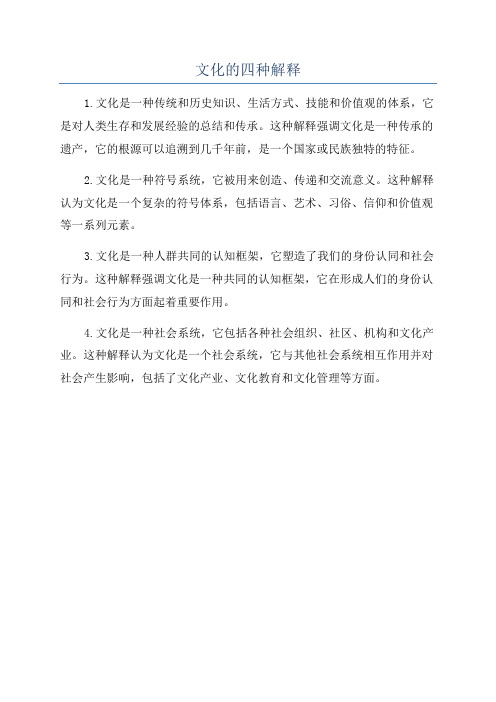
文化的四种解释
1.文化是一种传统和历史知识、生活方式、技能和价值观的体系,它是对人类生存和发展经验的总结和传承。
这种解释强调文化是一种传承的遗产,它的根源可以追溯到几千年前,是一个国家或民族独特的特征。
2.文化是一种符号系统,它被用来创造、传递和交流意义。
这种解释认为文化是一个复杂的符号体系,包括语言、艺术、习俗、信仰和价值观等一系列元素。
3.文化是一种人群共同的认知框架,它塑造了我们的身份认同和社会行为。
这种解释强调文化是一种共同的认知框架,它在形成人们的身份认同和社会行为方面起着重要作用。
4.文化是一种社会系统,它包括各种社会组织、社区、机构和文化产业。
这种解释认为文化是一个社会系统,它与其他社会系统相互作用并对社会产生影响,包括了文化产业、文化教育和文化管理等方面。
文化的含义
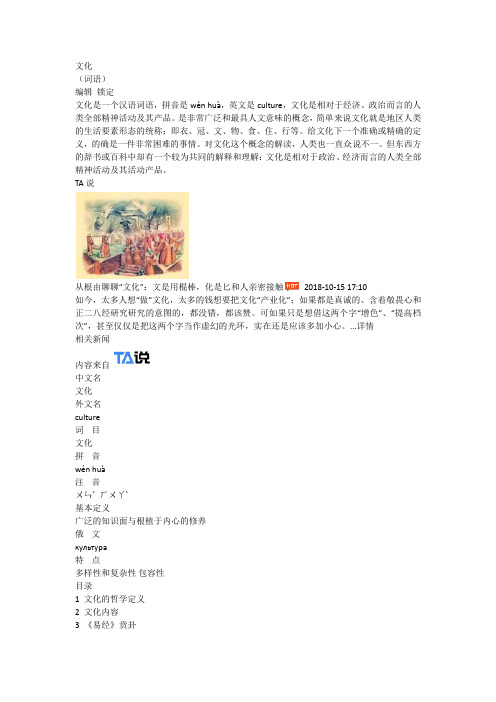
这里把非人类的智慧群族的文化称之为亚文化比较恰当一些。虽然它们具有人类文化的共同点,但是一个本质区别是人类的自主价值与自主意志是完全不同与其他智慧群族的。
文化文化内容
编辑
文化既包括世界观、人生观、价值观等具有意识形态性质的部分,又包括自然科学和技术、语言和文字等非意识形态的部分。
例如饮食,除了果腹的实用目的之外,我们还可以同时藉以表显精神上的意义。如当与人共食时,藉让食、劝食等以联谊互敬;当一人独食时,藉洁其粢盛、谨其举措来对越在天;或者,藉种种自定义的戒规以自律(如佛徒之茹素),藉特殊食物以怀古(如端午节粽子)。乃至单纯地藉食物精美制作,进食的优美仪态以表显人文的丰盛。凡此都足以显示人的生活,实能超越一已的封限而具有无限扩展延申的意义。这种能指向无限的特质便是人文活动真正的价值所在。所以称为进级的人文活动。[1]这种能赋予一切自然物或人为加工物以意义的活动是一种有有创造性的活动(此有异于上帝的创造而别称为道德创造)。这种形态的创造便称为"点化"。他一方面点化了人的生命,使人即于衣食住行的自然活动中,扩展拓深而顿时具有丰富充实的精神内涵;另一方面也点化了一切被人所用的物,使它在自然效用之余,同时也因参与了人的创造活动而成为亦具无限意义的礼物。于是人的自然行为化为礼行,自然秩序化为道德秩序。此世界不但因人初级的的人文活动(认知)而自黑暗进至彰明;且因人进级的人文活动(点化)而自无心进至有情,当进至有情,但是不但因人我因遂其相通而合一,人物亦因同于此浑融的情意中而合一。人不但能敬人爱人,也能敬物爱物,人物都不在我之外,此即王阳明所谓"心外无物",亦即孔子所谓"一日克己复礼,天下归仁焉"。世界到此合一无外的境界才是一个圆成的世界,而此圆成则是有待于人文活动的点化而后成功的。因此说"观乎人文,以化成天下",而约称之为"人文化成",或更约称之为"文化"。[2]
文化的意义和价值
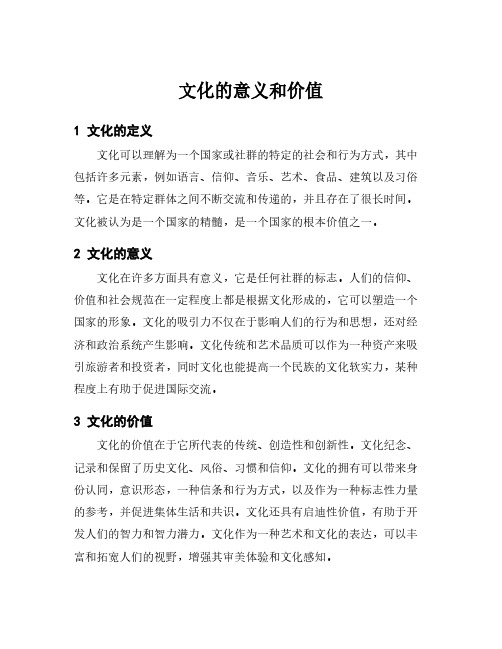
文化的意义和价值
1 文化的定义
文化可以理解为一个国家或社群的特定的社会和行为方式,其中包括许多元素,例如语言、信仰、音乐、艺术、食品、建筑以及习俗等。
它是在特定群体之间不断交流和传递的,并且存在了很长时间。
文化被认为是一个国家的精髓,是一个国家的根本价值之一。
2 文化的意义
文化在许多方面具有意义,它是任何社群的标志。
人们的信仰、价值和社会规范在一定程度上都是根据文化形成的,它可以塑造一个国家的形象。
文化的吸引力不仅在于影响人们的行为和思想,还对经济和政治系统产生影响。
文化传统和艺术品质可以作为一种资产来吸引旅游者和投资者,同时文化也能提高一个民族的文化软实力,某种程度上有助于促进国际交流。
3 文化的价值
文化的价值在于它所代表的传统、创造性和创新性。
文化纪念、记录和保留了历史文化、风俗、习惯和信仰。
文化的拥有可以带来身份认同,意识形态,一种信条和行为方式,以及作为一种标志性力量的参考,并促进集体生活和共识。
文化还具有启迪性价值,有助于开发人们的智力和智力潜力。
文化作为一种艺术和文化的表达,可以丰富和拓宽人们的视野,增强其审美体验和文化感知。
4 总结
文化是一个国家和民族的特色和标志。
它具有影响全球客群的价值——从经济、政治、社交到魅力、观念和信念。
它为我们提供了一组参考范本,以培育身边感觉与核心价值的准确结合,我们应该肩负起保护和延续我们民族文化的责任。
文化的基本概念

文化的基本概念
文化是一个相对而言较宽泛的概念,很难给出一个统一的定义。
但基本上,文化可以被视为一个社会群体所共有的价值观、信仰、传统、习俗、语言、艺术、技术等方面的综合体。
具体来说,文化包括以下几个基本要素:
1. 价值观和信仰:文化决定了一个社会群体所认同和重视的核心价值观念和信仰体系,包括道德准则、宗教信仰、道德法则等。
2. 社会组织和制度:文化塑造了社会组织的形式和制度,包括政治制度、法律体系、家庭结构、社会等级等。
3. 语言和沟通方式:文化决定了人们沟通交流的语言形式、语法、词汇以及非语言沟通的方式,如手势、肢体语言等。
4. 艺术和文化表达:文化是人们表达自身情感、思想和创造力的媒介,包括文学、音乐、绘画、雕塑、戏剧、舞蹈等艺术形式。
5. 传统和习俗:文化包含着一系列的传统、风俗习惯以及节日庆典,这些传统和习俗反映了一个社会群体的历史、身份和认同感。
6. 技术和生活方式:文化还影响着人们的生活方式和技术发展,在不同的文化中,人们对于生活的解决方案、技术应用以及食物、居住、服装等方面的偏好有所不同。
总之,文化是社会各个方面在长期发展和互动中共同形成的,它是人类社会的根基,对于个人和群体的认同、行为和思维方式有着重要影响。
文化的定义
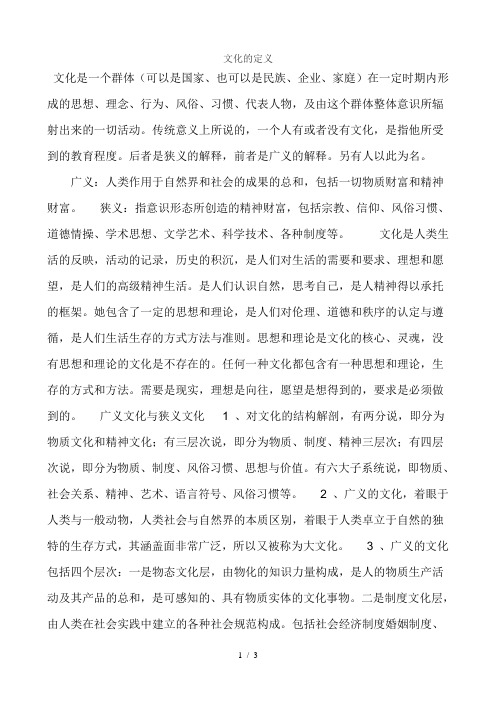
文化的定义文化是一个群体(可以是国家、也可以是民族、企业、家庭)在一定时期内形成的思想、理念、行为、风俗、习惯、代表人物,及由这个群体整体意识所辐射出来的一切活动。
传统意义上所说的,一个人有或者没有文化,是指他所受到的教育程度。
后者是狭义的解释,前者是广义的解释。
另有人以此为名。
广义:人类作用于自然界和社会的成果的总和,包括一切物质财富和精神财富。
狭义:指意识形态所创造的精神财富,包括宗教、信仰、风俗习惯、道德情操、学术思想、文学艺术、科学技术、各种制度等。
文化是人类生活的反映,活动的记录,历史的积沉,是人们对生活的需要和要求、理想和愿望,是人们的高级精神生活。
是人们认识自然,思考自己,是人精神得以承托的框架。
她包含了一定的思想和理论,是人们对伦理、道德和秩序的认定与遵循,是人们生活生存的方式方法与准则。
思想和理论是文化的核心、灵魂,没有思想和理论的文化是不存在的。
任何一种文化都包含有一种思想和理论,生存的方式和方法。
需要是现实,理想是向往,愿望是想得到的,要求是必须做到的。
广义文化与狭义文化 1 、对文化的结构解剖,有两分说,即分为物质文化和精神文化;有三层次说,即分为物质、制度、精神三层次;有四层次说,即分为物质、制度、风俗习惯、思想与价值。
有六大子系统说,即物质、社会关系、精神、艺术、语言符号、风俗习惯等。
2 、广义的文化,着眼于人类与一般动物,人类社会与自然界的本质区别,着眼于人类卓立于自然的独特的生存方式,其涵盖面非常广泛,所以又被称为大文化。
3 、广义的文化包括四个层次:一是物态文化层,由物化的知识力量构成,是人的物质生产活动及其产品的总和,是可感知的、具有物质实体的文化事物。
二是制度文化层,由人类在社会实践中建立的各种社会规范构成。
包括社会经济制度婚姻制度、家族制度、政治法律制度、家族、民族、国家、经济、政治、宗教社团、教育、科技、艺术组织等。
三是行为文化层,以民风民俗形态出现,见之于日常起居动作之中,具有鲜明的民族、地域特色。
文化的概念

文化的概念:广义的文化是指人类制造的一切物质产品和精神产品的总和。
狭义的文化专指语言、文学、艺术及一切意识形态在内的精神产品。
文化的特性:(一)普同性文化的普同性表现为社会实践活动中普同的文化形式,其特点是各个不同民族的意识和行为具有共同的、同一的样式。
世界文化的崇高抱负自古以来始终使文化有可能超越边界和国界。
文化的诸多领域,如哲学、道德、文学、艺术和训练等不但包含阶级的内容,而且包含全人类的、普同的原则。
这些原则促成各国人民的相互接近,各民族文化的相互融合。
目前,高新技术快速普及, 经济全球化进程加快,各民族生活方式的差距渐渐缩小,各地域独一无二的文化特征正在渐渐消融,民族特点正在淡化,整个世界文化更加趋向普同。
(二)多样性不同的自然、历史和社会条件,形成了不同的文化种类和文化模式,使得世界文化从整体上呈现出多样性的特征。
各民族文化各具特色,相互之间不行替代,它们都是全人类的共同财宝。
任何一个民族,即使是人数最少的民族,其文化成果假如遭到破坏都会是整个人类文化的损失。
(三)民族性文化总是根植于民族之中,与民族的进展相伴相生。
一个民族有一个民族的文化,不同民族有不同的民族文化。
民族文化是民族的表现形式之一,是各民族在长期历史进展过程中自然制造和进展起来的,具有本民族特色的文化。
民族文化就其内涵而言是极其丰富的,就其形式而言是多姿多彩的。
经常是民族的社会生产力水平愈高,历史愈长,其文化内涵就愈丰富,文化精神就愈猛烈,因而其民族性也就愈突出、愈鲜亮。
例如,美国格外强调个人的重要性,是一个高度个人主义的国家。
遇时美国也是一个高度有用主义的国家,强调利润、组织效率和生产效率。
它重视民主领导方式,倾向于集体决策与参与。
它对风险具有高度的承受性,具有低程度的不确定性的规避倾向。
日本文化则具有深厚的东方文化颜色,具有群体至上和整体献身的忘我精神。
它留意人际关系,有猛烈的家庭意识和等级观念。
日本文化还具有对优秀文化兼收并蓄的包涵力量和猛烈的理性精神。
文化的定义是什么

文化的定义是什么广义的文化是指人类创造的一切物质产品和精神产品的总和。
狭义的文化专指语言、文学、艺术及一切意识形态在内的精神产品。
在中国的古籍中,“文”既指文字、文章、文采,又指礼乐制度、法律条文等。
“化”是“教化”、“教行”的意思。
从社会治理的角度而言,“文化”是指以礼乐制度教化百姓。
“文化”一词在西方来源于拉丁文cultura,原义是指农耕及对植物的培育。
自15世纪以后,逐渐引申使用,把对人的品德和能力的培养也称之为文化。
于20世纪30年代著《文化论》一书,认为“文化是指那一群传统的器物,货品,技术,思想,习惯及价值而言的,这概念包容着及调节着一切社会科学。
用结构功能的观点来研究文化是英国人类学的一个传统。
英国人类学家A.R.拉德克利夫—布朗认为,文化是一定的社会群体或社会阶级与他人的接触交往中习得的思想、感觉和活动的方式。
文化是人们在相互交往中获得知识、技能、体验、观念、信仰和情操的过程。
他强调,文化只有在社会结构发挥功能时才能显现出来,如果离开社会结构体系就观察不到文化。
文化的要素主要包括:①精神要素,即精神文化。
②语言和符号。
两者具有相同的性质即表意性,在人类的交往活动中,二者都起着沟通的作用。
③规范体系。
规范是人们行为的准则,有约定俗成的如风俗等,也有明文规定的如法律条文、群体组织的规章制度等。
④社会关系和社会组织。
社会关系是上述各文化要素产生的基础。
⑤物质产品。
经过人类改造的自然环境和由人创造出来的一切物品,文化的一般特征主要有:①文化是由人类进化过程中衍生出来或创造出来的。
自然存在物不是文化,只有经过人类有意无意②文化是后天习得的。
文化不是先天的遗传本能,而是后天习得的经验和知识。
加工制作出来的东西才是文化。
③文化是共有的。
文化是人类共同创造的社会性产物,它必须为一个社会或群体的全体成员共同接受和遵循,才能成为文化。
④文化是一个连续不断的动态过程。
文化既是一定社会、一定时代的产物,是一份社会遗产,又是一个连续不断的积累过程。
什么是文化,文明,文学,文艺?

什么是⽂化,⽂明,⽂学,⽂艺?
什么是⽂化,⽂明,⽂学,⽂艺?
⽂化,是指⼈类的精神产物,⼈类在思想意识⽀配下的⼀切⾏为,都是⽂化,例如饮⾷⽂化,服装⽂化,居住⽂化,酒⽂化,⽟⽂化,茶⽂化,等等。
⽂化可以传播和继承,但⽂化也有精华和糟粕。
⽂明,则是指⼈和智慧⽣物类精神和物质产物的总和.⽂明包括精神⽂明和物质⽂明,也就是说,⽂明包括⽂化.⽂明分时代,有古代⽂明,现代⽂明,⽂明分地域,有亚洲⽂明,欧洲⽂明,美洲⽂明,⾮洲⽂明。
智慧⽣物⽂明如外星⽂明远古⽂明地下⽂明等是否存在尚⽆定论。
⽂学,是指⽤语⾔⽂字表现和记录的⼈类精神产物,有⼝头⽂学和语⾔⽂学之分,⽂学的表现形式有戏剧,电影,电视,⼩说,说唱,民谣,等等。
舞蹈是肢体语⾔,绘画是图象语⾔,也有⽂学性。
⽂艺,是指各种⽂学达到⽣产美感甚⾄令⼈着迷的程度.⼈类⼀切⾏为都可以达到艺术化的程度.例如劳动,战争,领导,等等.匠⼈和艺术家的区别就在于内在的精神和思想的⾼度深度不同。
⽽各种⽂学作品的艺术表现就是⽂艺.⽽⽂学戏剧电影电视舞蹈曲艺美术等⾏业构成⽂艺界。
什么是文化?

什么是文化?文化是一个复杂的概念,它涵盖了多个方面,包括传统、行为、信仰、语言、艺术等。
它是一种共同的生活方式,可与民族、语言和宗教等地位相同。
本文将从不同的角度探讨文化。
1. 文化的含义文化是指一类人的特定文化惯例、信仰、道德、风俗等。
它主要与它们的历史传统、地域环境、社会生活方式、宗教信仰和语言有关。
文化是一种共享的价值体系,它塑造了一群人的思想和行为方式。
2. 文化与传统文化和传统有密切关系。
传统是指长期被人们遵循和继承的社会的思想和行为方式。
文化可以在世代之间传承下去。
它们共同构成了民族和社会的基本特征。
3. 文化与行为人们的行为方式和文化密不可分。
文化可以影响人们的行为方式。
人们根据文化模式表达他们的观点和信仰,制定他们的生活方式,并在社会中相互交流。
文化可以塑造人的行为方式,使人们更加了解人与人之间的相互关系以及行为方式的精神内涵。
4. 文化与语言文化与语言之间的联系也非常紧密。
语言是沟通文化的重要工具,可以传递文化信息和知识。
人们的语言和文化方式可以反映出文化的特点和独特性。
因此,语言和文化可以彼此影响和塑造。
5. 文化与艺术艺术是文化的一部分。
艺术可以作为一种语言和表达,通过多种方式来展示人们的文化和生活方式。
音乐、绘画和文学等可以被用来表达文化价值、历史和传统。
艺术也可以传递观点和情感,这种传达过程补充了人们对文化的理解。
总结文化是复杂而多样化的。
它与传统、行为、语言和艺术等方面紧密相连。
文化是我们的生活方式和价值观的体现。
人们应该尊重和欣赏不同文化的独特之处,从而促进不同民族和社会之间的交流和理解。
文化是什么——关于文化的定义及其特性

文化是什么——关于文化的定义及其特性文化是人类自身创造和传承的一切精神和物质的产物。
它包括人类的价值观、信仰体系、道德规范、社会习俗、艺术作品、科学知识等等。
文化是人类生活的基础,贯穿于社会的方方面面,对个体和整个社会的发展起着至关重要的作用。
首先,文化是人类自身创造的。
人类具有独特的思考能力和创造力,在与自然界中的相互作用中,人类创造出了各种文化形式和实物。
这些创造体现了人类的智慧和创造力,并反映了人类对世界和自身的认知。
其次,文化是人类传承的。
文化并不是孤立的,而是通过一代代的传承和发展得以延续。
人们将文化知识、经验和价值观念通过教育、社交和其他方式传递给后代。
这种传承使得文化能够在时间中延续,并为后代提供参考和借鉴的基础。
文化具有以下几个特性:1.多样性:世界上存在着众多的文化,它们在语言、宗教、价值观念、社会习俗等方面多种多样。
不同的人群、地域和历史背景都会形成不同的文化。
2.动态性:文化是一个不断发展和演变的过程。
随着社会的变革和人类认识的不断深化,文化也会随之改变。
新的思想、技术和知识的出现,都会对文化产生影响。
3.基本性:文化是人类社会生活的基础。
它影响着人们的价值观、行为规范和社会关系。
文化是社会秩序和社会组织的重要依据。
4.共同性:文化是一个共同体的创造和传承。
它不是个体的产物,而是集体的成果。
通过共同的信仰、习俗和共享的文化的组成部分,人们建构起自己的身份感和归属感。
5.双重性:文化既是人类创造的,又对人类产生影响。
人们的行为和思维都受到文化的制约和塑造。
同时,文化的发展也反过来影响着人类的发展和社会的变革。
总之,文化是人类社会生活的基石,是人类智慧和创造力的结晶。
它不仅为人类提供认知和满足感,还为人类的社会发展提供了框架和基础。
因此,保护和传承优秀的文化是我们每个人义不容辞的责任。
只有通过对文化的理解和尊重,才能促进人类社会的和谐与共同进步。
什么是文化

(1)二者都为某一种族成没员所共有.
(2) 大部分文化行为也象本能一样,是潜意识的,不必通过思考而才学到.将它的刺激就能引起特定的反应.
因为:个人在生长过程中,经常在不知不觉间将社会现存的生活方式及习惯保存入脑,形成文化密码,由于这些离子的作用人就可以不经过大脑而得出种种行动,这一点上,与动物受到体能的支配一样.
②语言和符号。两者具有相同的性质即表意性,在人类的交往活动中,二者都起着沟通的作用。语言和符号还是文化积淀和贮存的手段。人类只有借助语言和符号才能沟通,只有沟通和互动才能创造文化。而文化的各个方面也只有通过语言和符号才能反映和传授。能够使用语言和符号从事生产和社会活动,创造出丰富多彩的文化,是人类特有的属性。
用结构功能的观点来研究文化是英国人类学的一个传统。英国人类学家A.R.拉德克利夫—布朗认为,文化是一定的社会群体或社会阶级与他人的接触交往中习得的思想、感觉和活动的方式。文化是人们在相互交往中获得知识、技能、体验、观念、信仰和情操的过程。他强调,文化只有在社会结构发挥功能时才能显现出来,如果离开社会结构体系就观察不到文化。例如,父与子、买者与卖者、统治者与被统治者的关系,只有在他们交往时才能显示出一定的文化。法国人类学家C.列维—斯特劳斯从行为规范和模式的角度给文化下定义。他提出:“文化是一组行为模式,在一定时期流行于一群人之中,……并易于与其它人群之行为模式相区别,且显示出清楚的不连续性”。英国人类学家R.弗思认为,文化就是社会。社会是什么,文化就是什么。他在1951年出版的《社会组织要素》一书中指出,如果认为社会是由一群具有特定生活方式的人组成的,那么文化就是生活方式。美国文化人类学家A.L.克罗伯和K.科拉克洪在1952年发表的《文化:一个概念定义的考评》中,分析考察了100多种文化定义,然后他们对文化下了一个综合定义:“文化存在于各种内隐的和外显的模式之中,借助符号的运用得以学习与传播,并构成人类群体的特殊成就,这些成就包括他们制造物品的各种具体式样,文化的基本要素是传统(通过历史衍生和由选择得到的)思想观念和价值,其中尤以价值观最为重要。”克罗伯和科拉克洪的文化定义为现代西方许多学者所接受。
对文化的理解

一、对文化的理解1.文化的由来文化在西文中为“CULTURE”,其古意是“农耕、开垦”,就是说文化的产生与农垦有关。
在汉语的文言文中与“纹”通假,指的是人工了的种种花纹、线纹或其他痕迹,当人类由狩猎时代向农耕时代过度时,人的自身特质也在发生着相应的变化,从而带来了人的种种文化表现。
我们今天所看到的、所知道的所有人类的活动都是文化现象(讲课、学习、活动也是一种文化现象),甚至现代人们所提倡的茶文化,饮食文化。
可见文化贯穿着人类发展的历史,只要有人类就有文化现象。
2.文化的分层虽然人们不能给文化下一个完整的定义,但普遍认为文化具有共性。
从文化的分层上看,可以分为观念文化、制度文化和器物文化三种。
其中观念文化是抽象的,包括文学、哲学、艺术、史学、心理学、伦理学等;制度文化是具体的,如刑法、宪法、行政法等一些典章制度及政治体制、经济体制等;器物文化是有型的,主要指科技,比如航空器、潜水艇、微电子、生命科学等。
因而人们把一定时代的文化称之为文明。
我们的活动不能一概称之为文明,要有综合的成果,比如行贿受贿、说粗话就不是综合成果,不能叫文明,我们习惯称之为不文明。
3.文化的两重性文化具有两重性,因为文化作为一种产物,它自身包含着这样的矛盾:它既是商品又不是商品。
作为意识形态不是商品,而作为物化形态通过市场得到传播又成为商品。
比如余秋雨写的散文,当这些散文写在稿纸上或者是正在印刷,它不是商品,而一旦出版既而摆到书店卖出去后才是商品。
再比如某人写了一首诗,那并不是商品,如果发表了而且又收到了稿费,这首诗又多了一个名字 -- -- 商品。
4.文化的濡化美国的人类学家赫斯科维茨提出了这样一个概念 -- 文化濡化,受教育就是文化濡化,被解说为“人类个体适应其文化并学会完全适应其身份角色的行为过程”。
既然是一个过程,就有开始也有终结,我们中国有一句古话叫“朝闻道,夕死可矣”,指的是学习悟道的濡化过程可以持续到人的最后一口气。
什么是文化

什么是文化?什么是文化?从字面来说,“文”指颜色交错的纹理,“化”指生成、造化,“文化”即指天道自然规律和人伦社会规律构成的复杂网络。
确切地说,文化是指一个国家或民族的历史、地理、风土人情、传统习俗、生活方式、文学艺术、行为规范、思维方式、价值观念等。
文化分为三个层次:高级文化,包括哲学、文学、艺术、宗教等;大众文化,指习俗、仪式以及包括衣食住行、人际关系各方面的生活方式;深层文化,主要指价值观的美丑定义,时间取向、生活节奏、解决问题的方式以及与性别、阶层、职业相关的个人角色。
文化涉及社会的方方面面,大到整个国家,小到一个企业,一个小家庭,一个个人。
作为英语专业的学生,我想通过中美家庭文化以及中美校园文化的差异来阐释文化。
中美家庭文化:在中国,在一个家庭中,父母和孩子扮演着不同的角色。
父母是家庭的核心,他们总是在孩子一出生时便为他安排好一切,而孩子就应该服从父母的一切安排。
并且,父母想要了解孩子的一切,并不想给孩子自由的空间,当孩子遇到问题时,他们便急切地想帮他解决。
因此,父母与孩子的关系是“上级对下级”的模式;在美国,父母并不为孩子安排命运,他们遵从孩子的意愿,希望孩子能做他想做的事。
并且,父母也给孩子足够的自由空间,当孩子遇到挫折,他们更希望孩子能够坚强地自己解决。
因此,父母与孩子的关系是“朋友式”的。
我们都知道,文化是一种社会现象,是人们长期创造形成的产物。
同时又是一种历史现象,是社会历史的积淀物。
因此,中美家庭文化差异与双方的历史有很大的关系。
首先,中国经历了长达两千多年的封建社会,是一个典型的明显的阶级国家;而美国基督教中呼喊的口号是“人人生而平等”。
再次,中国儒家文化中最重要的内容是“仁义礼让”,中国人素来尊老爱幼,提倡“以和为贵”;而美国人提倡“个人的权利”,即孩子在家庭中有权利做他喜欢做的事。
中美校园文化:我想分别以中国的四川大学和美国的耶鲁大学为列子来阐释文化的差异。
与前者相比,耶鲁大学更注重培养学生的人文精神。
文化的知识点
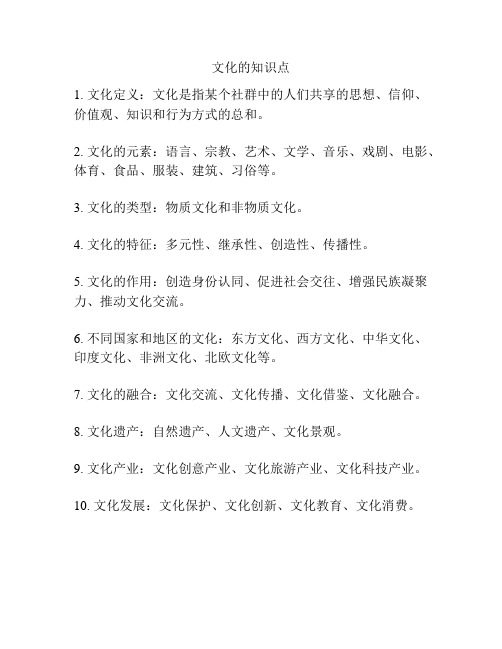
文化的知识点
1. 文化定义:文化是指某个社群中的人们共享的思想、信仰、价值观、知识和行为方式的总和。
2. 文化的元素:语言、宗教、艺术、文学、音乐、戏剧、电影、体育、食品、服装、建筑、习俗等。
3. 文化的类型:物质文化和非物质文化。
4. 文化的特征:多元性、继承性、创造性、传播性。
5. 文化的作用:创造身份认同、促进社会交往、增强民族凝聚力、推动文化交流。
6. 不同国家和地区的文化:东方文化、西方文化、中华文化、印度文化、非洲文化、北欧文化等。
7. 文化的融合:文化交流、文化传播、文化借鉴、文化融合。
8. 文化遗产:自然遗产、人文遗产、文化景观。
9. 文化产业:文化创意产业、文化旅游产业、文化科技产业。
10. 文化发展:文化保护、文化创新、文化教育、文化消费。
文化的含义与分类

一、文化的含义被我们译为“文化”的英文culture这个词源于拉丁语,其原来的含义是:耕耘、耕作,最初是指人们对自然界的改造和劳作之意,重在物质财富方面的创造。
“文化”一词早期在汉语中的含义是:文治教化。
如《说苑·指武》:“圣人之治天下也,先文德而后武力。
凡武之兴,为不服也;文化不改,然后加诛。
”可见,汉语中的“文化”重在精神的教育方面。
从“文艺复兴”时代开始,人们将在社会历史实践过程中所创造的物质财富和精神财富的总和都归入文化的范畴,凡经过人类实践活动改造和劳作过的一切自然物和人类实践的产物都是文化。
考古学上还用文化来指同一历史时期不依分布地点为转移的遗迹或遗物的综合体,包括具备使用相同的工具,同样的制造技术等共同的文化特征,如“仰韶文化”、“龙山文化”等。
日常生活中,人们还广泛地以“某个人有没有文化”来指其人运用文字的能力和具有的书本知识。
二、文化的分类文化的分类是多层次的,可初步分为物质文化和非物质文化。
物质文化又可分为衣、食、住、行等被人们加工过的,体现了人类主观能动性的一切物质领域的文化的总和。
根据内部的各自特征和用途,其中的每一领域又可分出众多的类别。
如衣服可分为军装、警服、西装、中山装、寿服、婚纱、童装等,住房可分为西式建筑、中式建筑、民族建筑等,饮食亦分为众多的菜系以及各具地方民族特色的名小吃。
非物质文化是与物质文化相对应的其他文化的总和,可初步区分为精神文化和制度文化两类。
精神文化包括:宗教、文学、艺术、音乐等领域,其中的每一领域又可分为众多的类别,如宗教除了佛教、基督教和伊斯兰教世界三大宗教外,还有无法确切统计的众多种类的大大小小的宗教,以及不断产生的新兴宗教。
而且每一种大的宗教中又区分出众多的宗教派别。
对文化的认识和理解
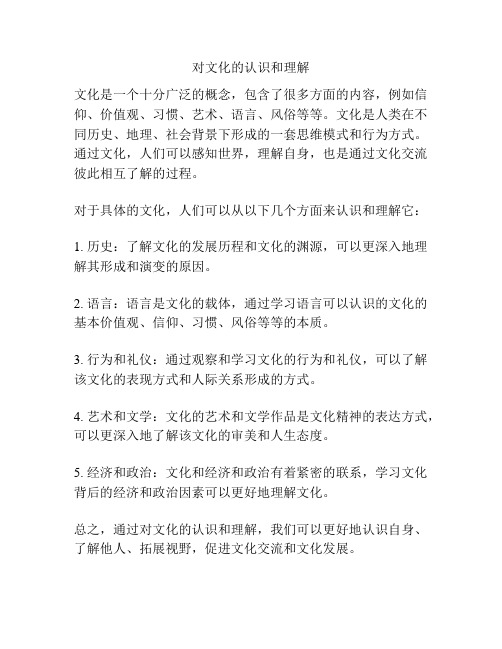
对文化的认识和理解
文化是一个十分广泛的概念,包含了很多方面的内容,例如信仰、价值观、习惯、艺术、语言、风俗等等。
文化是人类在不同历史、地理、社会背景下形成的一套思维模式和行为方式。
通过文化,人们可以感知世界,理解自身,也是通过文化交流彼此相互了解的过程。
对于具体的文化,人们可以从以下几个方面来认识和理解它:
1. 历史:了解文化的发展历程和文化的渊源,可以更深入地理解其形成和演变的原因。
2. 语言:语言是文化的载体,通过学习语言可以认识的文化的基本价值观、信仰、习惯、风俗等等的本质。
3. 行为和礼仪:通过观察和学习文化的行为和礼仪,可以了解该文化的表现方式和人际关系形成的方式。
4. 艺术和文学:文化的艺术和文学作品是文化精神的表达方式,可以更深入地了解该文化的审美和人生态度。
5. 经济和政治:文化和经济和政治有着紧密的联系,学习文化背后的经济和政治因素可以更好地理解文化。
总之,通过对文化的认识和理解,我们可以更好地认识自身、了解他人、拓展视野,促进文化交流和文化发展。
- 1、下载文档前请自行甄别文档内容的完整性,平台不提供额外的编辑、内容补充、找答案等附加服务。
- 2、"仅部分预览"的文档,不可在线预览部分如存在完整性等问题,可反馈申请退款(可完整预览的文档不适用该条件!)。
- 3、如文档侵犯您的权益,请联系客服反馈,我们会尽快为您处理(人工客服工作时间:9:00-18:30)。
A Comparison Study on Chinese Values and American Values Abstract: In the increasingly wide range of cross-cultural communication activities, both sides of communication between different ethnic groups often feel a strong cultural conflict, such as verbal behavior, will show distinct cultural difference. But both the unique communication mode and a certain code of conduct would be subject to their own national values constraints and restrains, which also reflect the nature of the national value. As Profess or Hu Wenzhong once side: “The concept of the core values of culture and values are not created out of thin air, its emergence and development of historical and cultural traditions inseparable.” Okabe once pointed out that cultural value in the communication plays a vital role in the smooth communication depends on difference in cultural values of both the size of this gap as the difference in cross-cultural communication is often obvious. The values of people as disposable human brain, like speech acts, resulting in a variety of ethnic and cultural difference between the cognitive differences between the values of different nations, is to understand language, social and cultural difference, a necessary prerequisite for the final cross-cultural communication will be laid for the “communication” basis. So it is important to learn the different values between China and America, I will take some thing about it.Key words: China, America, different values1. IntroductionAs we all know, every country in the world has its discipline and laws to guarantee that its social system will function well, and we human beings also have to live under the restraint of these rules, while disciplines and laws cannot be the only element of a social system. Even though we share some general values such as hardworking, honest and loyalty, due to the different environment we live in, each country will have its featured values that are different from any other country. Take Chinese value and American value for example. Both of the two countries appreciate kindness, honest, diligence and some other nice value; however, they have many different values.Americans are very independent, for instance, parents in American family seldom interpose what their children are doing, they prefer to let their children develop themselves freely; on the contrary, and this kind of attitude would be regarded as irresponsible in Chinese society. Besides, American children choose tolive alone without their parents, while we Chinese usually enjoy living with parents or even grandparents in a big family. Americans usually respect other people’s privacy, even between friends they seldom ask” personal question” , such as age, salary and marital status. Yet when we Chinese have a chat, we usually want to have the idea about others’ personal information, which is considered impolite in America.Americans are more go-as-you-easy not only in dress or entertainment, but also in interpersonal communication, despite there maybe a sharp gab between the two people on their age or status. Nevertheless, we Chinese have been thought much about etiquette, we appreciate those who show courtesy in interaction, we are taught to respect the aged and cherish the young since we were children. If we call our parents’ or teachers’ na me instead of their real salutations like western people, we will be considered discourteous and disrespectful.We may be familiar with the situation where a leader or somebody like that in a meeting keeps saying that how many achievements they have achieved during the past years. This often happens in China since Chinese seem to be bound up with our” brilliant, admirable” past. But it will seldom take place in America, where people are usually future oriented. In America, people will not be satisfied with what they have got, instead, they tend to look forward and keep moving. No matter what may happen in the future, they just face it.In conclusion, since there are differences between Chinese and American value, we’d better realize their advantage and disad vantage. And we can adopt its good points and avoid its weak points, so that it may help us to be better men.2. Basic American values and AssumptionsHow does American culture differ from others? “Values” are ideas about what is right and wrong, desirable and undesirable, normal and abnormal, proper and improper. “Assumptions” here are the postulates, about people, life, and the way things are. Most people who grow up in a particular culture share certain values and assumption overlap and support each other. They fit tighter. A culture can be viewed as a collection of values and assumption that go together to shape the way a group of people perceive and relate to the world around them. American culture refers to the dominant patterns of thinking and behaving of mainstream Americans.The United States probably has a greater diversity of racial, ethnic, cultural, and religions groups meant that accepting diversity was the only practical choice. However, many Americans come to see strength in their country’s di versity and there is more recognition of the value of cultural diversity than at any other time in thehistory. The Declaration of Independence reflect Americans beliefs, “We hold these truths to be self-evidence, that all men are created equal, that are endowed by their creator with certain inalienable rights, that among these are life, Liberty and the pursuit of Happiness”.The core American assumptions and values organized into form of activity, form of social relations, perception of self and the individual, etc. assumptions and values discussed in this part are the dominant and values commonly associated with the American middle class.2. 1 Individual Freedom and Self-RelianceThe belief in the freedom of the individual is probably the most basic and most strongly held of all American belief. The most important thing to understand about Americans is probably their devotion to “individualism”. They have been trained since very early in their lives to consider themselves as separate individuals who are responsible for their own situations in life and their own destines.The earliest settlers came to the North American continents to establish colonies that were free from the controls that existed in European societies. They wanted to escape the controls placed on their lives by kings and governments, priests and churches. To a great extent, they succeeded. In 1776 the British colonial settlers declared their independence from England and established a new nation, the United States of America. In doing so, they overthrow the original control and declared that the power to govern would lie in the hands of the people. In 1789, when they wrote the Constitution for their new nation, they separated Church and the state so that there would never be a government-supported church. This greatly limited the power of the church. Also, in writing the Constitution they expressly forbade titles of nobility to ensure that an aristocratic society would not develop. There would be no ruling class of noblemen in the new nation. The historic decisions made by those first settlers have had a profound effect on the shaping of the American character. By limiting the power of the government and the churches and eliminating a formal aristocracy, they created a climate of freedom where the emphasis was on the individual. The United States came to be associated in their minds with the concept of individual freedom. This is probably the most basic of all the American values.Perhaps the word “freedom” is one of the most respected popular w ords in the United States. By “freedom”, Americans mean the desire and the ability of all individuals control their own destiny without outside interference from the government, a ruling noble class, the church, all any other organized authority. Thedesire to be free of controls was a basic value of the new nation, and it has continued to attract immigrants to this country. We can see this in the way Americans treat their children. Even very young children are given opportunities to make their own choices and express their opinions: the child’s preference will normally be accommodated. Through this process, Americans come to see themselves as separate human beings who have their own opinions and who are responsible for their own decisions.However, there is a price to be paid for this individual freedom: self-reliance. Americans believe that individual must learn to rely on themselves of risk losing freedom. This means achieving both financial and emotional independence from their parents as early as possible. It means that Americans believe they should take care of themselves, solve their own problems, and stand on their own feet. They are apt to imagine that their whole destiny is in their own hands. This strong belief in self-reliance continues to today as a basic American value. Americans believe that they must be self-reliant in order to keep their freedom. If they rely too much on the support of their families, of the government or any organization, they may not be free to do what they want.Self-improvement and Self-help seem at the core of American ideology. Americans are trained to convince of themselves as separate individual, and they assume everyone else in the world is too. When they encounter a person from abroad who seems to them excessively concerned with the opinions of parents, with following traditions, or with fulfilling obligation to others, they assume that the person feels trapped or is weak, indecisive, or overly dependent. They assume all people must resent being in situations where, they are not free to make up their own minds. They resume that after living for a time in the United States people will come to feel liberated from constraints arising outside themselves and will be grateful for the opportunity to do their own thing and have their own way. It is this concept of themselves as individual decision makers that blinds at least some Americans to the fact that they have independently made up their own minds about the values and assumption they hold. Americans consider the ideal person to be an individualistic, self-reliant, independent person. Americans admire people who have overcome adverse circumstances and succeeded in life. The blind and deaf author and lecturer Helen Keller is an example.The individual that Americans idealize prefers an atmosphere of freedom, where neither the government nor any other external force of agency dictates what the individual does. For Americans, the idea of individual freedom has strong, positiveconnotations. Foreigners who understand the degree to which Americans are imbued with the nation that the free, self-reliant individual is the ideal kind of human being will be able to understand many aspects of American behavior and thinking.It is not unusual for Americans who are beyond the age of about twenty and who are still living with their parents to pay their parents for room and board. Elderly parents living with their grown children may do likewise. By being dependent, not only do they risk losing freedom, but they also risk losing the respect of their peers. Even if they are not truly self-reliant, most Americans believe they must at least appear to be so. In order to be in the mainstream of Americans life, individuals must be seen as self-reliant. Although receiving financial support from charity, family, all the government is allowed, it is never admired. Many people believe that such individuals are setting a bad example that may weaken the American character as a whole.2.2 Equality of opportunity and competitionEquality of opportunity and competition is another basic American value. Americans believe in the ideal, as stated in their Declaration of Independence, that” all men are created equal”. Although they sometimes violate the ideal in their daily lives, Americans have a deep faith that in some fundamental way all people are of equal value, that no one is born superior to anyone else. This is the second important reason why immigrants have traditionally been drawn to the United States, which is the belief that everyone has a chance to succeed in the United States. Generations of immigrants from the earliest settlers to the present day have come with this expectation. They have felt that because individuals are free from excessive political, religious, and social controls, they have a better chance for success. Particularly important is the lack of a hereditary aristocracy.Because titles of nobility were forbidden in the Constitution, no formal class system developed in the United States. In the early years of American history many immigrants chose to leave the older European societies, believing that they had a better chance to succeed in America than in “the old country”, where their place in life was determined largely by the social class into which they were born. They knew that in America they would not have to live among noble families who possessed great power and wealth inherited and accumulated over hundreds of years. The hopes of many of these immigrants were fulfilled in their new country. The low social class into which many were born did not prevent then from wishing to a higher social position. Many found that they did indeed have compete with others. If every personhas an equal chance to succeed in the United Stated., then it is every person’s duty to try. Americans match their energy and intelligence against that of their neighbors in a competitive contest for success.The pressure to compete cause an American to be energetic, but it also places a constant emotional strain on him. When he retires at age sixty-five, he is at last free from the pressures of competition. But then a new problem arises. He tends to feel useless and wanted in a society that gives so much prestige to those who compete well. This is one reason why older people in the United States do not have as much honor and respect as they have in other less competitive societies. In fact, any person who does not compete successfully for whatever reason does not fit into the mainstream of American life as well as those who do.2.3Material wealth and Hard WorkA main reason that immigrants have come to the United States is to have a better life. That is, people wanted to raise their standard of living. For the vast majority of the immigrants who come here, it was probably the most compelling reason for leaving their homeland. Because of its incredibly abundant natural resources, the United States appeared to be a” land of plenty” where millions could come to seek their fortunes. Of course, most immigrants did not get rich overnight, and many of them suffered terribly, but the majority of them were eventually able to improve upon their former standard of living. Even if they were not able to achieve the economic success they wanted, they could be fairly certain that their children would have the opportunity for a better life.” Going from rags” became a slogan for the great American dream. The dream come true for many of the immigrants. They achieved material success; they became very attached to material things. Material wealth became a value to the American people.Placing a high value on material possession is called “materialism”. Americans are often criticized for being so “materialistic” so concerned with acquiring possession. Americans do not like to be called materialistic because they feel that this unfairly accuses them of loving only material things and of having no religions values. In fact, Americans do that is hard work. The North American continent was rich in natural resources when the first settlers arrived, but all these resources were undeveloped. Only by hard work could these natural resources be converted into material possession and a comfortable standard of living. Hard work has been both necessary and rewarding for most American throughout their history. Because of this, they have come to see material possession as the natural reward for their hard work.In some ways, material possessions are seen not only as tangible evidence of people’s work, but also of their abilities. The difference in material possession reflected a difference in personal abilities. Most Americans believe that if a person works hard, it is possible to have a good standard of living. Over 90% of young Americans think they will achieve what they want in life, and almost eight out of ten think they can get what they want through hard work. They have been taught that it is a good thing to work hard and acquire more material badges of their success, and that means a better future for them.3. ConclusionDiscussion of these points is from the different values of Chinese and America; we can not forget a very important question: the characteristics of each nation have its leading side and revealed some different phenomenon in the same time. The traditional values and moral are still the main characteristic, especially in the vast rural areas, people still urgent need to improve the living condition, and the media need should be strengthened, their openness of the degree of awareness in people’s mind and ideas is also not deep enough, the basic of the cultural level need further increase, so the knowledge of many things still remain in the original level, and it is different to achieve lots of things in the object and comprehensive degree.。
